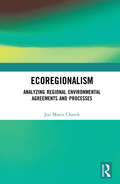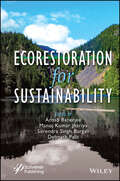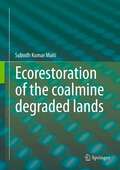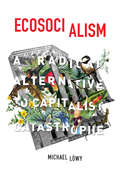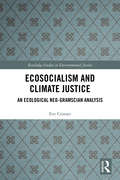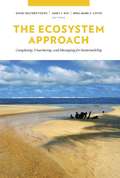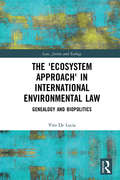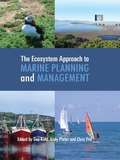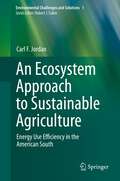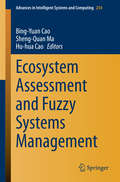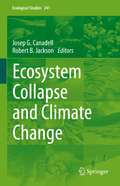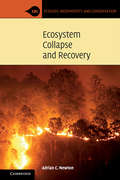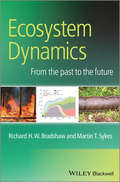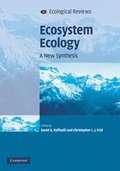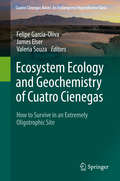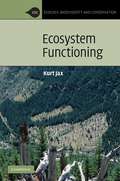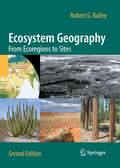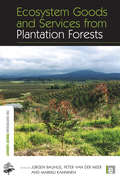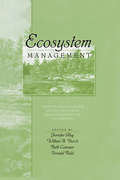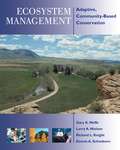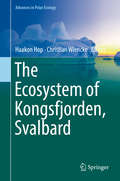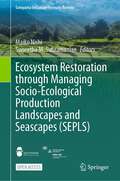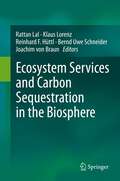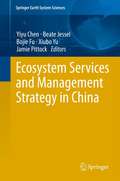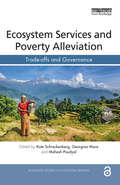- Table View
- List View
Ecoregionalism: Analyzing Regional Environmental Agreements and Processes
by Jon Marco ChurchThis book provides a comprehensive understanding of environmental regionalism at the international level, analyzing the concept and identifying recurring patterns from six in-depth case studies. While ecoregions or environmental regions are defined on ecological boundaries rather than administrative criteria, ecoregionalism is the idea that regional dynamics should cluster around ecoregions, while ecoregionalization is the tendency of regional dynamics to cluster around ecoregions. Focusing on the international level, this book presents six cases of ecoregional processes from around the world and the regional environmental agreements: two are terrestrial, the Alps and the Andes; two are marine, the Mediterranean Sea and the Baltic Sea; two are related to freshwater ecosystems: the Amu Darya in Central Asia and the Great Lakes in North America. The book analyzes both ecoregional processes focused on the environment, as well as intersectoral ecoregional processes. The case studies are analyzed based on the ecoregional governance framework, developed by the author for this book. Despite the diversity of context, the similarity of the governance system of the six cases is striking. Several recurring patterns have been identified, which may also extend to the subnational level. They are not design principles, but may be taken into consideration for the design or redesign of current and future regional environmental agreements and processes. This book will be of great interest to students and scholars of environmental politics, natural resource management, spatial planning and international relations.
Ecorestoration for Sustainability
by Arnab Banerjee Manoj Kumar Jhariya Surendra Singh Bargali Debnath PalitECORESTORATION for SUSTAINABILITY With climate change and land degradation advancing at an alarming rate, the state of the global ecosystem and how it can be restored in our march toward sustainability is incredibly important, and this new, groundbreaking volume tackles these important issues head-on. Environmental degradation is causing severe impacts on the various Earth ecosystems. Unsustainable development and anthropogenic pressure have altered the natural balance. From this perspective, sustainability has become a major issue to frame a greener and cleaner Earth for future generations. It can be argued that the worst example of unsustainable development is habitat degradation. Therefore, ecorestoration and other ecological practices are becoming increasingly important in our march toward sustainability. The present book covers all the aspects of ecorestoration and sustainability and how various areas intersect in this space. Environmental degradation is increasing all over the world at an unprecedented rate. This includes air, water, soil, and other natural resources resulting in the depletion of natural resources and an unsustainable planet. Therefore, it is incredibly important to restore the ecosystem’s health and services to maintain homeostasis. In this context, ecorestoration approaches in the form of eco-friendly technologies need to be formulated to promote the protection and conservation of various ecosystems. These approaches include freshwater bodies, soil and mined-out wasteland, degraded forest, biodiversity, and other degraded ecosystems. This important new volume from Wiley-Scrivener tackles these problems from a practical perspective, offering solutions and new methods for restoring our suffering global ecosystem. Edited by a team of experts, this collaboration of papers on these issues is a further step in our march toward sustainability. Whether for the engineer, scientist, or student, it is a must-have for any library.
Ecorestoration of the coalmine degraded lands
by Subodh Kumar MaitiThe book adopts an application-oriented approach for ecorestoration of coalmine degraded. The theoretical aspects of ecorestoration, and steps involved in ecorestoration process and experimental aspects of thorough analytical procedures have been discussed in detail. It emphasizes on the types of mining, land degradation, and biodiversity conservation while giving details of technical and biological steps, topsoil management, selection of plant species, seeding, nursery practices; adoption of innovative approaches like mulching, biofertlizer application, hydroseeding, superabsorbent; use of grass-legume mix; monitoring and aftercare of reclaimed sites; the indicators of sustainable ecorestoration; and Rules and Acts implemented and followed across the world. Best ecorestoration practices, mine closure issues, collection, laboratory analysis and interpretation of minesoil and topsoil samples, monitoring biological parameters, litterfall and tree growth analysis, erosion management, design of drainage and sedimentation retention basin, and brief description of tree species with identifying character for field people are all part of the book. [Message by Prominent Academician] It is now urgent that methods of coal mining be integrated with engineering for ecorestoration because the larger society will not accept devastated waste land. A book, coming out from the hands of one of the persistent researchers of the field, cannot be more timely. Jayanta Bhattacharya, PhD FNAE Professor, Department of Mining Engineering Indian Institute of Technology, Kharagpur-721302, India.
Ecosocialism
by Michael LöwyCapitalism is killing the planet, and the preservation of a natural environment favorable to human life requires a radical alternative. In this new collection of essays, long time revolutionary and environmental activist Michael Löwy offers a vision of ecosocialist transformation. This vision combines an understanding of the destructive logic of the capitalist system with an appreciation for ongoing struggles, particularly in Latin America.
Ecosocialism and Climate Justice: An Ecological Neo-Gramscian Analysis (Routledge Studies in Environmental Justice)
by Eve CroeserThis book investigates the broader climate movement to contextualise the role played by its climate justice wing, focusing specifically on the theoretical and practical contributions of ecosocialists. Ecosocialism and Climate Justice provides an account of the shift from the Holocene to the Anthropocene in the context of the global spread of capitalist relations of production. Croeser begins by critically analysing the root causes of anthropogenic climate change and identifies the origins and development of the current climate movement within civil society. She then focuses on the climate justice movement, analysing the ways in which anthropogenic global warming may be challenged in a way that is socially just. Overall, this book provides further insight into the effectiveness of ecosocialist theory and activism in the context of existing global, national and local power relationships. This book will be of great interest to students and scholars of climate justice, climate politics, critical global political economy studies and environmental activism.
The Ecosystem Approach: Complexity, Uncertainty, and Managing for Sustainability
by James J. Kay Nina-Marie E. Lister David Waltner-ToewsIs sustainable development a workable solution for today's environmental problems? Is it scientifically defensible? Best known for applying ecological theory to the engineering problems of everyday life, the late scholar James J. Kay was a leader in the study of social and ecological complexity and the thermodynamics of ecosystems. Drawing from his immensely important work, as well as the research of his students and colleagues, The Ecosystem Approach is a guide to the aspects of complex systems theories relevant to social-ecological management. Advancing a methodology that is rooted in good theory and practice, this book features case studies conducted in the Arctic and Africa, in Canada and Kathmandu, and in the Peruvian Amazon, Chesapeake Bay, and Chennai, India. Applying a systems approach to concrete environmental issues, this volume is geared toward scientists, engineers, and sustainable development scholars and practitioners who are attuned to the ideas of the Resilience Alliance-an international group of scientists who take a more holistic view of ecology and environmental problem-solving. Chapters cover the origins and rebirth of the ecosystem approach in ecology; the bridging of science and values; the challenge of governance in complex systems; systemic and participatory approaches to management; and the place for cultural diversity in the quest for global sustainability.
The 'Ecosystem Approach' in International Environmental Law: Genealogy and Biopolitics (Law, Justice and Ecology)
by Vito De LuciaThe ecosystem approach, broadly understood as a legal and governance strategy for integrated environmental and biodiversity management, has been adopted within a wide variety of international environmental legal regimes and provides a narrative, a policy approach and in some cases legally binding obligations for States to implement what has been called a ‘new paradigm’ of environmental management. In this last respect, the ecosystem approach is also often considered to offer an opportunity to move beyond the outdated anthropocentric framework underpinning much of international environmental law, thus helping re-think law in the Anthropocene. Against this background, this book addresses the question of whether the ecosystem approach represents a paradigm shift in international environmental law and governance, or whether it is in conceptual and operative continuity with legal modernity. This central question is explored through a combined genealogical and biopolitical framework, which reveals how the ecosystem approach is the result of multiple contingencies and contestations, and of the interplay of divergent and sometimes irreconcilable ideological projects. The ecosystem approach, this books shows, does not have a univocal identity, and must be understood as both signalling the potential for a decisive shift in the philosophical orientation of law and the operationalisation of a biopolitical framework of control that is in continuity with, and even intensifies, the eco-destructive tendencies of legal modernity. It is, however, in revealing this disjunction that the book opens up the possibility of moving beyond the already tired assessment of environmental law through the binary of anthropocentrism and ecocentrism.
The Ecosystem Approach to Marine Planning and Management (Earthscan Oceans)
by Sue Kidd Andy Plater Chris FridThe marine environment is one of our most precious yet fragile natural resources. It provides a wide range of essential goods and services, including food, regulation of climate and nutrient cycling, as well as a setting for transport, recreation and tourism. This environment is however extremely complex and very sensitive to development pressures and other forms of human influence. Planning and management of the sea are similarly complicated, reflecting intricate legal, institutional and ownerships patterns. This creates a situation where marine ecosystems are vulnerable to over-exploitation or neglect. The Ecosystem Approach to Marine Planning and Management describes how growing concern about the state of our seas is resulting in the development of new approaches to marine planning and management. For example, the United Nations Environment Programme has called for the widespread introduction of Marine Spatial Planning (MSP), and the European Union has recently been consulting on a new European Maritime Policy designed to stimulate economic growth but at the same time protect the resource base. Within the United Kingdom, the 2010 Marine Act draws upon the experience of town and country planning and brings into being a new system of Marine Spatial Planning. The authors show that a common feature of all these developments is an appreciation that more integrated forms of planning and management are required for our seas and that new arrangements must draw together understanding from natural science, social science and many other perspectives. Adopting such a trans-disciplinary and holistic (or 'ecosystems') approach, the book distils the expertise of these different disciplines and seeks to promote a broader understanding of the origins and practicalities of new approaches to marine planning and management.
An Ecosystem Approach to Sustainable Agriculture: Energy Use Efficiency in the American South (Environmental Challenges and Solutions #1)
by Carl F. JordanModern industrial agriculture is not sustainable because of its heavy reliance on petroleum, a non-renewable source of the energy used in farming, and because of pollution caused by petroleum products such as fertilizers and pesticides. A systems analysis of farming suggests that agriculture will be more sustainable when services of nature, such as nutrient recycling by soil micro-organisms and natural controls of insects, replace the services now provided by energy from petroleum. Examples are drawn from the Southeastern USA, but lessons learned can be applied worldwide.
Ecosystem Assessment and Fuzzy Systems Management
by Bing-Yuan Cao Sheng-Quan Ma Hu-Hua Cao"Ecosystem Assessment and Fuzzy Systems Management" is the edited outcome of the 3rd International Conference on Ecosystem Assessment Management (ICEAM) and the Workshop on the Construction of an Early Warning Platform for Eco-tourism (WCEWPE) in Hainan on May 5-12, 2013, Haikou, China. The 3rd ICEAM and the WCEWPE, built on the success of previous conferences, are major Symposiums for scientists, engineers and logistic management researchers presenting their the latest achievements, developments and applications in all areas of Ecosystem Assessment Management, Early Warning Platform for Eco-tourism and fuzziology. It aims to strengthen relations between industry research laboratories and universities, and to create a primary symposium for world scientists. The book, containing 47 papers, is divided into five parts: "Ecosystem Assessment, Management and Information"; "Intelligent Algorithm, Fuzzy Optimization and Engineering Application"; "Spatial Data Analysis and Intelligent Information Processing"; "Tourism Culture, Development and Planning" and "Application of Operations Research and Fuzzy Systems".
Ecosystem Collapse and Climate Change (Ecological Studies #241)
by Robert B. Jackson Josep G. CanadellHuman-driven greenhouse emissions are increasing the velocity of climate change and the frequency and intensity of climate extremes far above historical levels. These changes, along with other human-perturbations, are setting the conditions for more rapid and abrupt ecosystem dynamics and collapse.This book presents new evidence on the rapid emergence of ecosystem collapse in response to the progression of anthropogenic climate change dynamics that are expected to intensify as the climate continues to warm. Discussing implications for biodiversity conservation, the chapters provide examples of such dynamics globally covering polar and boreal ecosystems, temperate and semi-arid ecosystems, as well as tropical and temperate coastal ecosystems.Given its scope, the volume appeals to scientists in the fields of general ecology, terrestrial and coastal ecology, climate change impacts, and biodiversity conservation.
Ecosystem Collapse and Recovery (Ecology, Biodiversity and Conservation)
by Adrian C. NewtonThere is a growing concern that many important ecosystems, such as coral reefs and tropical rain forests, might be at risk of sudden collapse as a result of human disturbance. At the same time, efforts to support the recovery of degraded ecosystems are increasing, through approaches such as ecological restoration and rewilding. Given the dependence of human livelihoods on the multiple benefits provided by ecosystems, there is an urgent need to understand the situations under which ecosystem collapse can occur, and how ecosystem recovery can best be supported. To help develop this understanding, this volume provides the first scientific account of the ecological mechanisms associated with the collapse of ecosystems and their subsequent recovery. After providing an overview of relevant theory, the text evaluates these ideas in the light of available empirical evidence, by profiling case studies drawn from both contemporary and prehistoric ecosystems. Implications for conservation policy and practice are then examined.
Ecosystem Dynamics
by Richard Bradshaw Martin SykesEcosystem Dynamics focuses on long-term terrestrial ecosystems and their changing relationships with human societies. The unique aspect of this text is the long-time scale under consideration as data and insights from the last 10,000 years are used to place present-day ecosystem status into a temporal perspective and to test models that generate forecasts of future conditions. Descriptions and assessments of some of the current modelling tools that are used, along with their uncertainties and assumptions, are an important feature of this book. An overarching theme explores the dynamic interactions between human societies and ecosystem functioning and services. This book is authoritative but accessible and provides a useful background for all students, practitioners, and researchers interested in the subject.
Ecosystem Ecology
by David G. Raffaelli Christopher L. J. FridWhat can ecological science contribute to the sustainable management and conservation of the natural systems that underpin human well-being? Bridging the natural, physical and social sciences, this book shows how ecosystem ecology can inform the ecosystem services approach to environmental management. The authors recognise that ecosystems are rich in linkages between biophysical and social elements that generate powerful intrinsic dynamics. Unlike traditional reductionist approaches, the holistic perspective adopted here is able to explain the increasing range of scientific studies that have highlighted unexpected consequences of human activity, such as the lack of recovery of cod populations on the Grand Banks despite nearly two decades of fishery closures, or the degradation of Australia's fertile land through salt intrusion. Written primarily for researchers and graduate students in ecology and environmental management, it provides an accessible discussion of some of the most important aspects of ecosystem ecology and the potential relationships between them.
Ecosystem Ecology and Geochemistry of Cuatro Cienegas: How To Survive In An Extremely Oligotrophic Site (Cuatro Ciénegas Basin: An Endangered Hyperdiverse Oasis Ser.)
by Valeria Souza James Elser Felipe García-OlivaCarbon (C), Nitrogen (N) and Phosphorus (P) are three of the most important elements used to build living beings, and their uptake from the environment is consequently essential for all organisms. Photosynthesis is the process in which plants absorb atmospheric C as they grow and convert it to biomass. However, plants acquire N and P only when these are available in the soil solution, which makes these elements the most limiting nutrients in plant growth and productivity in most ecosystems. When plant residues and roots decompose, the C, N and P they contain is transformed primarily into soil organic matter (SOM) or C and N can release to the atmosphere. Recent interest on the global C, N and P cycles has focused attention on the different proportion of terrestrial C, N and P stored in different ecosystem pools. Cuatro Cienegas represents an exceptional place, since the plants are not the base of the food web, they are the microbial community, that recycle the elements essential for life. In this book we describe how this is an analog of early Earth.
Ecosystem Functioning
by Kurt JaxIn the face of decreasing biodiversity and ongoing global changes, maintaining ecosystem functioning is seen both as a means to preserve biological diversity as well as for safeguarding human well-being by securing the services ecosystems provide. The concept today is prominent in many fields of ecology and conservation biology, such as biodiversity research, ecosystem management, or restoration ecology. Although the idea of ecosystem functioning is important, the concept itself remains rather vague and elusive. This book provides a novel analysis and integrated synthesis of different approaches to conceptualising and assessing ecosystem functioning. It links the natural sciences with methodologies from philosophy and the social sciences, and introduces a new methodology for a clearer and more efficient application of ecosystem functioning concepts in practice. Special emphasis is laid on the social dimensions of the concept and the ways it influences research practice. Several case studies relate theoretical analyses to practical application.
Ecosystem Geography
by Robert G. BaileyThis book outlines a system that subdivides the Earth into a hierarchy of increasingly finer-scale ecosystems that can serve as a consistent framework for ecological analysis and management. The system consists of a three-part, nested hierarchy of ecosystem units and associated mapping criteria. This new edition has been updated throughout with new text, figures, diagrams, photographs, and tables.
Ecosystem Goods and Services from Plantation Forests (The Earthscan Forest Library)
by Jurgen Bauhus Peter Van Meer Markku KanninenPlantation forests often have a negative image. They are typically assumed to be poor substitutes for natural forests, particularly in terms of biodiversity conservation, carbon storage, provision of clean drinking water and other non-timber goods and services. Often they are monocultures that do not appear to invite people for recreation and other direct uses. Yet as this book clearly shows, they can play a vital role in the provision of ecosystem services, when compared to agriculture and other forms of land use or when natural forests have been degraded. This is the first book to examine explicitly the non-timber goods and services provided by plantation forests, including soil, water and biodiversity conservation, as well as carbon sequestration and the provision of local livelihoods. The authors show that, if we require a higher provision of ecosystem goods and services from both temperate and tropical plantations, new approaches to their management are required. These include policies, methods for valuing the services, the practices of small landholders, landscape approaches to optimise delivery of goods and services, and technical issues about how to achieve suitable solutions at the scale of forest stands. While providing original theoretical insights, the book also gives guidance for plantation managers, policy-makers, conservation practitioners and community advocates, who seek to promote or strengthen the multiple-use of forest plantations for improved benefits for society. Published with CIFOR
Ecosystem Management: Adaptive Strategies For Natural Resource Organizations in the Twenty-First Century
by William BurchThis book documents some of the perceptions, strategies, and actions of natural resource agencies in the twenty-first century as they seek to respond to the changed reality influencing their policies and practices. It considers some of the responses in tools, techniques, and organizational change.
Ecosystem Management: Adaptive, Community-Based Conservation
by Richard L. Knight Gary Meffe Dennis Schenborn Larry NielsenToday's natural resource managers must be able to navigate among the complicated interactions and conflicting interests of diverse stakeholders and decisionmakers. Technical and scientific knowledge, though necessary, are not sufficient. Science is merely one component in a multifaceted world of decision making. And while the demands of resource management have changed greatly, natural resource education and textbooks have not. Until now. Ecosystem Management represents a different kind of textbook for a different kind of course. It offers a new and exciting approach that engages students in active problem solving by using detailed landscape scenarios that reflect the complex issues and conflicting interests that face today's resource managers and scientists. Focusing on the application of the sciences of ecology and conservation biology to real-world concerns, it emphasizes the intricate ecological, socioeconomic, and institutional matrix in which natural resource management functions, and illustrates how to be more effective in that challenging arena. Each chapter is rich with exercises to help facilitate problem-based learning. The main text is supplemented by boxes and figures that provide examples, perspectives, definitions, summaries, and learning tools, along with a variety of essays written by practitioners with on-the-ground experience in applying the principles of ecosystem management. Accompanying the textbook is an instructor's manual that provides a detailed overview of the book and specific guidance on designing a course around it. Ecosystem Management grew out of a training course developed and presented by the authors for the U.S. Fish and Wildlife Service at its National Training Center in Shepherdstown, West Virginia. In 20 offerings to more than 600 natural resource professionals, the authors learned a great deal about what is needed to function successfully as a professional resource manager. The book offers important insights and a unique perspective dervied from that invaluable experience.
The Ecosystem of Kongsfjorden, Svalbard (Advances in Polar Ecology #2)
by Haakon Hop Christian WienckeThis book focuses in detail on all ecologically important aspects of the Kongsfjorden system such as the marine and atmospheric environment including long-term monitoring, Ecophysiology of individual species, structure and function of the ecosystem, ecological processes and biological communities.The contributed articles include review articles and research articles that have a wider approach and bring the current research up-to-date. This book will form a baseline for future work.
Ecosystem Restoration through Managing Socio-Ecological Production Landscapes and Seascapes (Satoyama Initiative Thematic Review)
by Maiko Nishi Suneetha M. SubramanianThis open access book is a compilation of case studies that provide useful knowledge and lessons that derive from on-the-ground activities and contribute to policy recommendations, focusing on the relevance of social-ecological production landscapes and seascapes (SEPLS) to ecosystem restoration. Building on the concept of SEPLS, the Satoyama Initiative promotes landscape approaches as integrative area-based strategies to bring together diverse stakeholders aiming to balance multiple objectives, including conservation and development, for the benefit of biodiversity and human well-being. Many of the SEPLS case studies from the International Partnership for the Satoyama Initiative (IPSI) offer rich evidence to help guide restoration efforts while advancing relevant knowledge and practices. The book highlights how the efforts in managing SEPLS can contribute to ecosystem restoration and sustainable development, looking at the strategies and approaches by which multiple stakeholders express, negotiate, and embrace their plural value perspectives of nature to restore ecosystems within a landscape or seascape. It begins with an introductory chapter followed by twelve case studies and a synthesis clarifying the relevance of the case study findings to policy and academic discussions. This book will be of interest to scholars, policymakers and professionals in the field related to sustainable development, especially on SDGs 15 and 17.
Ecosystem Services and Carbon Sequestration in the Biosphere
by Joachim Von Braun Rattan Lal Bernd Uwe Schneider Klaus Lorenz Reinhard F. HüttlEcological functions and human wellbeing depend on ecosystem services. Among the ecosystem services are provisional (food, feed, fuel, fiber), regulating (carbon sequestration, waste recycling, water cleansing), cultural (aesthetic, recreational, spiritual), and supporting services (soil formation, photosynthesis, nutrient cycling). Many relationships of various degree exist among ecosystem services. Thus, land use and soil management to enhance biospheric carbon sinks for carbon sequestration requires a comprehensive understanding on the effects on ecosystem services. Payments for ecosystem services including carbon pricing must address the relationship between carbon sequestration and ecosystem services to minimize risks of overshoot, and promote sustainable use of land-based carbon sinks for human wellbeing.
Ecosystem Services and Management Strategy in China
by Yiyu Chen Beate Jessel Jamie Pittock Bojie Fu Xiubo Yu"Ecosystem Services and Management Strategy in China" is a two-year international cooperation project that culminated from the China Council for International Cooperation on Environment and Development's Task Force on Ecosystem Services and Management. It combines case studies, scenario analysis, and stakeholder consultations that focus on Chinese forest, grassland and wetland ecosystems and assesses the economic and social benefits of sustainable ecosystems management. It also identifies better practices in ecosystem management from Chinese and international experience and recommends a more intensive integration of ecosystem services into decision-making processes. In November 2010, the Task Force presented five strategic policy proposals for the implementation of sustainable management for Chinese ecosystems. These proposals were extremely well-received by senior decision makers and have since been adopted by national government agencies. The book represents a valuable reference work for researchers and professionals working in related areas. Professor Yiyu Chen worked as president at the National Natural Science Foundation of China from 2004 to early 2013 and is Member of the Chinese Academy of Sciences. Professor Beate Jessel works as president at the Federal Agency for Nature Conservation, Germany. Professor Bojie Fu works at the Research Center of Eco-Environment Sciences, CAS and is Member of the Chinese Academy of Sciences. Professor Xiubo Yu works at the Institute of Geographic Sciences and Natural Resources Research, Chinese Academy of Sciences. Dr.Jamie Pittock is a Senior Lecturer at the Fenner School of Environment and Society, Australian National University, Australia.
Ecosystem Services and Poverty Alleviation: Trade-offs and Governance (Routledge Studies in Ecosystem Services)
by Kate Schreckenberg Georgina Mace Mahesh PoudyalUnderstanding how to sustain the services that ecosystems provide in support of human wellbeing is an active and growing research area. This book provides a state-of-the-art review of current thinking on the links between ecosystem services and poverty alleviation. In part it showcases the key findings of the Ecosystem Services for Poverty Alleviation (ESPA) programme, which has funded over 120 research projects in more than 50 countries since 2010. ESPA’s goal is to ensure that ecosystems are being sustainably managed in a way that contributes to poverty alleviation as well as to inclusive and sustainable growth. As governments across the world map how they will achieve the 17 ambitious Sustainable Development Goals, most of which have poverty alleviation, wellbeing and sustainable environmental management at their heart, ESPA’s findings have never been more timely and relevant. The book synthesises the headline messages and compelling evidence to address the questions at the heart of ecosystems and wellbeing research. The authors, all leading specialists, address the evolving framings and contexts for the work, review the impacts of ongoing drivers of change, present new ways to achieve sustainable wellbeing, equity, diversity, and resilience, and evaluate the potential contributions from conservation projects, payment schemes, and novel governance approaches across scales from local to national and international. The cross-cutting, thematic chapters challenge conventional wisdom in some areas, and validate new methods and approaches for sustainable development in others. The book will provide a rich and important reference source for advanced students, researchers and policy-makers in ecology, environmental studies, ecological economics and sustainable development. The Open Access version of this book, available at https://www.taylorfrancis.com/books/e/9780429016295, has been made available under a Creative Commons Attribution-Non Commercial-No Derivatives 4.0 license.
